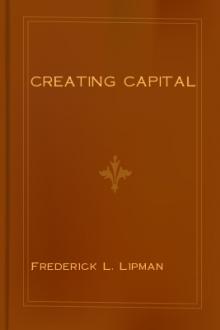The Man-Eaters of Tsavo - J. H. Patterson (funny books to read txt) 📗

- Author: J. H. Patterson
- Performer: -
Book online «The Man-Eaters of Tsavo - J. H. Patterson (funny books to read txt) 📗». Author J. H. Patterson
jungle and prepare a
road on which to lay
the double trolley line.
One morning when they
were thus engaged, a
little paa — a kind of
very small antelope —
sprang out and found
itself suddenly in the
midst of a gang of
coolies. Terrified and confused by the shouting of the men, it ran straight at Shere Shah, the jemadar, who promptly dropped a basket over it and held it fast. I happened to arrive just in time to save the graceful little animal’s life, and took it home to my camp, where it very soon became a great pet. Indeed, it grew so tame that it would jump upon my table at meal times and eat from my hand.
When the road for the trolley line was cleared, the next piece of work was the building of the two temporary bridges over the river. These we made in the roughest fashion out of palm trees and logs felled at the crossing places, and had a flood come down they would, of course, have both been swept away; fortunately, however, this did not occur until the permanent work was completed. The whole of this feeding line was finished in a very short time, and trollies were soon plying backwards and forwards with loads of stone and sand, as we also discovered the latter in abundance and of good quality in the bed of the ravine. An amusing incident occurred one day when I was taking a photograph of an enormous block of stone which was being hauled across one of these temporary bridges. As the trolley with its heavy load required very careful manipulation, my head mason, Heera Singh, stood on the top of the stone to direct operations, while the overseer, Purshotam Hurjee, superintended the gangs of men who hauled the ropes at either end in order to steady it up and down the inclines. But we did not know that the stream had succeeded in washing away the foundations of one of the log supports; and as the weight of the trolley with the stone came on the undermined pier, the rails tilted up and over went the whole thing into the river, just as I snapped the picture. Heera Singh made a wild spring into the water to get clear of the falling stone, while Purshotam and the rest fled as if for their lives to the bank. It was altogether a most comical sight, and an extraordinary chance that at the very moment of the accident I should be taking a photograph of the operation.
Fortunately, no one was injured in the slightest, and the stone was recovered undamaged with but little trouble.
Not long after this occurrence my own labours were one day nearly brought to a sudden and unpleasant end. I was travelling along in an empty trolley which, pushed by two sturdy Pathans, was returning to the quarry for sand.
Presently we came to the sharp incline which led to the log bridge over the river. Here it was the custom of the men, instead of running beside the trolley, to step on to it and to let its own momentum take it down the slope, moderating its speed when necessary by a brake in the shape of a pole, which one of them carried and by which the wheels could be locked. On this occasion, however, the pole was by some accident dropped overboard, and down the hill we flew without brake of any kind. Near the bridge there was a sharp curve in the line, where I was afraid the trolley would jump the rails; still, I thought it was better to stick to it than to risk leaping off. A moment afterwards I felt myself flying head first over the edge of the bridge, just missing by a hair’s breadth a projecting beam; but luckily I landed on a sand bank at the side of the river, the heavy trolley falling clear of me with a dull thud close by. This accident, also, was happily unattended by injury to anyone.
TROUBLES WITH THE WORKMEN
It seemed fated that the building of the Tsavo Bridge should never be allowed to proceed in peace for any length of time. I have already described our troubles with the lions; and no sooner did the beasts of prey appear to have deserted us, for the time being at any rate, than other troubles, no less serious, arose with the workmen themselves. After I had discovered the stone for the bridge, I sent down to the coast for gangs of masons to work and dress it. The men who were sent me for this purpose were mostly Pathans and were supposed to be expert workmen; but I soon found that many of them had not the faintest notion of stone-cutting, and were simply ordinary coolies who had posed as masons in order to draw forty-five instead of twelve rupees a month. On discovering this fact, I immediately instituted a system of piecework, and drew up a scale of pay which would enable the genuine mason to earn his forty-five rupees a month — and a little more if he felt inclined — and would cut down the impostors to about their proper pay as coolies. Now, as is often the case in this world, the impostors were greatly in the majority; and accordingly they attempted to intimidate the remainder into coming down to their own standard as regards output of work, in the hope of thereby inducing me to abandon the piecework system of payment.
This, however, I had no intention of doing, as I knew that I had demanded only a perfectly fair amount of work from each man.
These masons were continually having quarrels and fights amongst themselves, and I had frequently to go down to their camp to quell disturbances and to separate the Hindus from the Mohammedans.
One particularly serious disturbance of this sort had a rather amusing sequel. I was sitting after dusk one evening at the door of my hut, when I heard a great commotion in the masons’ camp, which lay only a few hundred yards away.
Presently a jemadar came rushing up to me to say that the men were all fighting and murdering each other with sticks and stones. I ran back with him at once and succeeded in restoring order, but found seven badly injured men lying stretched out on the ground. These I had carried up to my own boma on charpoys (native beds); and Brock being away, I had to play the doctor myself as best I could, stitching one and bandaging another and generally doing what was possible.
There was one man, however, who groaned loudly and held a cloth over his face as if he were dying. On lifting this covering, I found him to be a certain mason called Karim Bux, who was well known to me as a prime mischief-maker among the men. I examined him carefully, but as I could discover nothing amiss, I concluded that he must have received some internal injury, and accordingly told him that I would send him to the hospital at Voi (about thirty miles down the line) to be attended to properly. He was then carried back to his camp, groaning grievously all the time.
Scarcely had he been removed, when the head jemadar came and informed me that the man was not hurt at all, and that as a matter of fact he was the sole cause of the disturbance. He was now pretending to be badly injured, in order to escape the punishment which he knew he would receive if I discovered that he was the instigator of the trouble. On hearing this, I gave instructions that he was not to go to Voi in the special train with the others; but I had not heard the last of him yet. About eleven o’clock that night I was called up and asked to go down to the masons’ camp to see a man who was supposed to be dying. I at once pulled on my boots, got some brandy and ran down to the camp, where to my surprise and amusement I found that it was my friend Karim Bux who was at death’s door. It was perfectly evident to me that he was only “foxing,” but when he asked for dawa (medicine), I told him gravely that I would give him some very good dawa in the morning.
Next day at noon — when it was my custom to have evil-doers brought up for judgment — I asked for Karim Bux, but was told that he was too ill to walk. I accordingly ordered him to be carried to my boma, and in a few moments he arrived in his charpoy, which was shouldered by four coolies who, I could see, knew quite well that he was only shamming. There were also a score or so of his friends hanging around, doubtless waiting in the expectation of seeing the “Sahib” hoodwinked. When the bed was placed on the ground near me, I lifted the blanket with which he had covered himself and thoroughly examined him, at the same time feeling him to make sure that he had no fever. He pretended to be desperately ill and again asked for dawa; but having finally satisfied myself that it was as the jemadar had said — pure budmashi (devilment) — I told him that I was going to give him some very effective dawa, and carefully covered him up again, pulling the blanket over his head. I then got a big armful of shavings from a carpenter’s bench which was close by, put them under the bed and set fire to them. As soon as the sham invalid felt the heat, he peeped over the edge of the blanket; and when he saw the smoke and flame leaping up round him, he threw the blanket from him, sprang from the bed exclaiming “Beiman shaitan!” (“Unbelieving devil!”), and fled like a deer to the entrance of my boma, pursued by a Sikh sepoy, who got in a couple of good whacks on his shoulders with a stout stick before he effected his escape. His amused comrades greeted me with shouts of “Shabash, Sahib!” (“Well done, sir”), and I never had any further trouble with Karim Bux. He came back later in the day, with clasped hands imploring forgiveness, which I readily granted, as he was a clever workman.
A few days after





Comments (0)